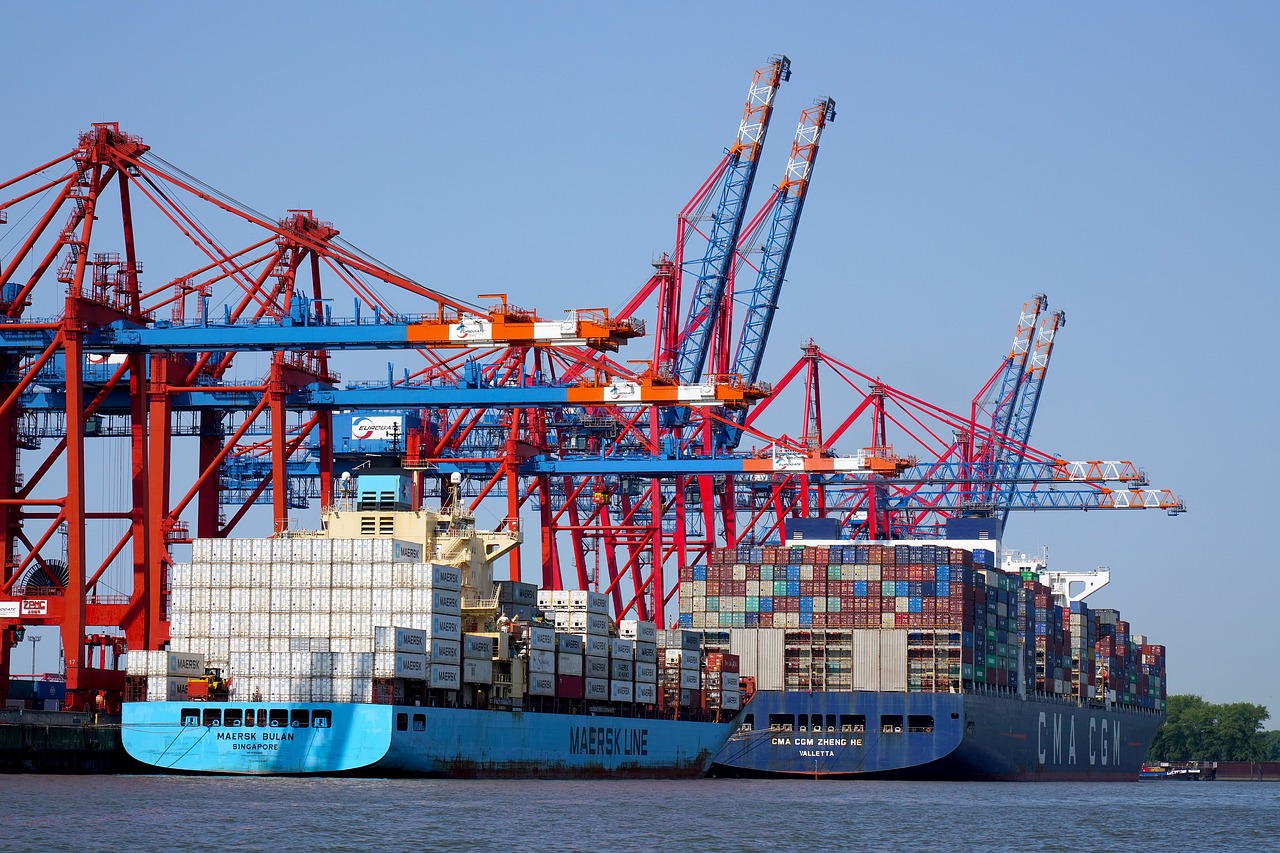How Blockchain Can Improve Supply Chain Efficiency
In today's fast-paced world, where every second counts, the need for efficient supply chains has never been more critical. As businesses strive to enhance their operations, blockchain technology emerges as a beacon of hope, promising to revolutionize the way companies manage their supply chains. Imagine a world where every transaction is recorded in a transparent and secure manner, where delays are minimized, and trust is built among all stakeholders. This is not just a dream; it's the reality that blockchain can bring to supply chain management.
Blockchain, at its core, is a decentralized digital ledger that records transactions across multiple computers. This means that no single entity has control over the data, ensuring that it remains immutable and transparent. Each transaction is time-stamped and linked to the previous one, creating a chain of information that is virtually tamper-proof. This fundamental principle of blockchain not only enhances security but also fosters a sense of trust among parties involved in the supply chain. When everyone can access the same data in real-time, misunderstandings and disputes become a thing of the past.
One of the most exciting aspects of blockchain technology is its ability to enable real-time tracking of goods. Picture this: you're a retailer eagerly awaiting a shipment of products. With blockchain, you can track that shipment every step of the way, from the moment it leaves the supplier to when it arrives at your doorstep. This level of visibility minimizes delays, enhances accountability, and allows for proactive decision-making. No more guessing games or anxious phone calls to suppliers; everything is at your fingertips.
Moreover, blockchain introduces the concept of smart contracts, which are self-executing contracts with the terms directly written into code. These contracts automate processes, reducing the need for intermediaries and streamlining operations. For instance, imagine a scenario where a shipment is delayed. A smart contract could automatically trigger penalties or adjustments without the need for manual intervention. This not only saves time but also reduces the potential for human error.
Another significant benefit of blockchain is its ability to combat fraud and counterfeiting. In an era where counterfeit goods can damage brand reputation and consumer trust, blockchain provides a secure and transparent way to verify product authenticity. Each product can be traced back to its origin, ensuring that consumers receive what they pay for. This is particularly crucial in industries such as pharmaceuticals and luxury goods, where the stakes are high.
Traceability is another critical aspect of supply chain management that blockchain enhances. Companies can quickly identify and address issues in the supply chain, whether it's a quality control problem or a compliance issue. With blockchain, every product's journey is documented, allowing businesses to pinpoint the source of any problems swiftly. This level of transparency not only improves operational efficiency but also strengthens compliance with industry regulations.
However, despite its numerous advantages, implementing blockchain in supply chains is not without challenges. Companies often face technical hurdles when integrating blockchain with existing systems. Legacy systems can be complex and costly to adapt, requiring careful planning and execution. Additionally, navigating regulatory frameworks is essential for successful blockchain adoption. Compliance challenges can arise, and businesses must ensure that their blockchain implementations meet industry standards and regulations.
In conclusion, the transformative potential of blockchain technology in supply chain management is undeniable. By enhancing transparency, enabling real-time tracking, automating processes through smart contracts, and improving traceability, blockchain can significantly boost supply chain efficiency. However, companies must also be prepared to tackle the challenges that come with implementing this innovative technology. As we move forward, the question remains: are you ready to embrace the future of supply chain management?
- What is blockchain technology? Blockchain is a decentralized digital ledger that records transactions securely across multiple computers.
- How does blockchain enhance supply chain efficiency? It improves transparency, enables real-time tracking, automates processes, and enhances traceability.
- What are smart contracts? Smart contracts are self-executing contracts with the terms written into code, which automate processes in supply chain transactions.
- What challenges do companies face when implementing blockchain? Companies may encounter technical, regulatory, and organizational hurdles during the adoption process.

Understanding Blockchain Technology
Blockchain technology is often hailed as a revolutionary force in various industries, particularly in supply chain management. But what exactly is it? At its core, blockchain is a decentralized digital ledger that records transactions across a network of computers. This means that no single entity has control over the entire system, making it inherently more secure and transparent than traditional databases. Imagine a public library where every book is a transaction, and everyone can see who borrowed which book and when. This is how blockchain operates, offering a clear and immutable record of every transaction.
One of the fundamental principles of blockchain is immutability. Once a transaction is recorded on the blockchain, it cannot be altered or deleted. This feature is crucial for supply chains, where any changes to transaction data could lead to significant issues, such as fraud or miscommunication. Additionally, the transparency provided by blockchain means that all parties involved in the supply chain have access to the same information in real-time. This level of visibility fosters trust among stakeholders, as everyone can verify the authenticity of transactions without relying on a central authority.
Moreover, security is another pillar of blockchain technology. Each transaction is encrypted and linked to the previous one, creating a chain of blocks that is nearly impossible to tamper with. To put it simply, hacking a blockchain would require an attacker to alter every block in the chain across all distributed copies, which is a daunting task. This robust security framework not only protects sensitive data but also enhances the overall integrity of supply chain operations.
In summary, the principles of blockchain—decentralization, immutability, transparency, and security—combine to create a powerful tool for improving supply chain efficiency. As businesses continue to explore the potential of blockchain, they are discovering innovative ways to leverage its capabilities, ensuring that their operations are not only efficient but also trustworthy and secure.

Enhancing Transparency in Supply Chains
In today's fast-paced market, transparency is no longer just a buzzword; it's a necessity. The traditional supply chain is often shrouded in mystery, with various stakeholders operating in silos. This lack of visibility can lead to inefficiencies, misunderstandings, and even loss of trust among partners. However, with the advent of blockchain technology, we are witnessing a paradigm shift that is redefining how transparency is perceived and implemented in supply chains. Imagine a world where every transaction is visible to all parties involved, where trust is built not on promises but on verifiable data. This is the power of blockchain.
One of the most significant advantages of blockchain is its ability to provide real-time access to information. Through a decentralized ledger, all participants in the supply chain can see the same data at the same time. This immediate access helps to eliminate discrepancies and fosters a culture of accountability. For example, if a shipment is delayed, everyone from the manufacturer to the retailer can see the status of that shipment instantly, allowing them to respond proactively rather than reactively.
Moreover, this transparency enhances trust among stakeholders. When everyone has access to the same information, it reduces the chances of fraud and miscommunication. This is particularly important in industries where the authenticity of products is crucial. For instance, in the food industry, blockchain can track the journey of a product from farm to table, ensuring that consumers receive safe and genuine products. The ability to trace back through the supply chain not only assures consumers but also empowers companies to take swift action in case of any quality issues.
To illustrate the impact of transparency in supply chains, consider the following table:
| Aspect | Traditional Supply Chain | Blockchain-Enabled Supply Chain |
|---|---|---|
| Data Access | Limited to specific stakeholders | Accessible to all parties in real-time |
| Trust Level | Dependent on relationships | Built on verifiable data |
| Fraud Risk | Higher due to lack of oversight | Lower due to immutable records |
| Response Time | Delayed due to communication gaps | Immediate due to real-time updates |
This table highlights the stark contrast between traditional supply chains and those utilizing blockchain technology. The shift towards transparency not only streamlines operations but also enhances the overall resilience of the supply chain. As companies embrace this technology, they are not just improving their efficiency; they are also cultivating a culture of trust and collaboration.
In conclusion, enhancing transparency in supply chains through blockchain technology is not just about improving operational efficiency—it's about revolutionizing the way businesses interact with each other and with their customers. By fostering an environment of trust and accountability, companies can not only survive but thrive in an increasingly competitive landscape.
- What is blockchain technology? Blockchain is a decentralized digital ledger that records transactions in a secure and transparent manner.
- How does blockchain enhance transparency? It allows all parties in the supply chain to access the same data in real-time, reducing discrepancies and fostering trust.
- Can blockchain reduce fraud? Yes, its immutable nature helps combat fraud and counterfeiting by ensuring product authenticity.
- What are the challenges of implementing blockchain? Challenges include integration with legacy systems, regulatory compliance, and the need for organizational change.

Real-Time Tracking of Goods
Imagine you're waiting for a package to arrive, and instead of just crossing your fingers and hoping for the best, you can actually see its journey in real-time. This is the magic of real-time tracking enabled by blockchain technology. It’s like having a GPS for your goods, where every twist and turn is recorded and accessible to all parties involved in the supply chain. With blockchain, each transaction or movement of goods is logged on a decentralized ledger, providing a transparent and tamper-proof history of the product's journey from origin to destination.
One of the most significant advantages of real-time tracking is the ability to minimize delays. When every stakeholder—from manufacturers to retailers—has access to the same data, everyone can coordinate more effectively. For instance, if a shipment is delayed at a port, all parties can see this information instantly and make adjustments accordingly. This level of visibility fosters accountability among suppliers and distributors, ensuring that everyone is on the same page. No more playing the blame game when things go wrong; instead, it's about collaboration and swift problem-solving.
Furthermore, real-time tracking enhances customer satisfaction. Consumers today expect transparency and timely updates about their orders. With blockchain, companies can provide their customers with accurate information about where their products are at any given moment. This not only builds trust but also allows businesses to offer better service. Imagine receiving a notification that your package is just a few blocks away—how cool is that?
To illustrate the impact of real-time tracking, consider the following table that compares traditional tracking methods with blockchain-based tracking:
| Feature | Traditional Tracking | Blockchain Tracking |
|---|---|---|
| Data Access | Limited to specific stakeholders | Accessible to all parties in real-time |
| Transparency | Opaque; prone to errors | Transparent; tamper-proof records |
| Delay Management | Reactive; information may be outdated | Proactive; instant updates |
| Cost Efficiency | Higher costs due to inefficiencies | Lower costs through streamlined processes |
In summary, real-time tracking of goods through blockchain technology is not just a trend; it's a game-changer. It transforms the way businesses operate, enhances collaboration, and significantly improves customer satisfaction. With the power of blockchain, companies can ensure that their supply chains are not only efficient but also transparent and trustworthy.
- What is blockchain technology? Blockchain is a decentralized digital ledger that securely records transactions across multiple computers.
- How does real-time tracking work? Real-time tracking allows all parties in the supply chain to access live updates on the location and status of goods through a shared blockchain ledger.
- Can blockchain help reduce costs? Yes, by streamlining processes and improving transparency, blockchain can significantly lower operational costs in the supply chain.
- What are smart contracts? Smart contracts are self-executing contracts with the terms directly written into code, enabling automated processes in supply chain transactions.

Smart Contracts for Automation
In the realm of supply chain management, the term smart contracts might sound like something out of a sci-fi movie, but they are very much a reality that is reshaping the industry. So, what exactly are smart contracts? Imagine a contract that automatically executes itself when certain conditions are met—no middlemen, no delays, just pure efficiency. These self-executing contracts are coded with the terms of the agreement directly embedded within them, allowing for seamless transactions that are both quick and reliable. This means that when a shipment reaches a certain point in the supply chain, payment can be automatically released without any human intervention, cutting down on processing time and reducing the potential for errors.
But the benefits of smart contracts extend far beyond just speeding up transactions. They also bring a level of transparency and security that was previously unattainable. Since all parties involved in the supply chain have access to the same data, there’s a significant reduction in disputes. For instance, if a supplier fails to deliver goods on time, the smart contract can automatically trigger penalties, ensuring accountability. This not only protects the interests of all stakeholders but also fosters a culture of trust, which is vital in any business relationship.
Moreover, smart contracts can help automate various processes within the supply chain, such as:
- Order Processing: Automating order placement and confirmation reduces manual work and speeds up the entire process.
- Inventory Management: Smart contracts can automatically adjust inventory levels in real-time, ensuring that stock levels are always accurate.
- Payment Processing: Payments can be released automatically upon confirmation of delivery, streamlining financial transactions.
However, the implementation of smart contracts is not without its challenges. Companies must ensure that the code is written accurately to avoid any loopholes that could be exploited. Additionally, all parties involved must agree on the terms and conditions, which can sometimes be a hurdle in itself. Yet, the potential rewards are substantial. By automating routine tasks, businesses can redirect their resources towards more strategic initiatives, ultimately enhancing their competitive edge.
In conclusion, smart contracts represent a significant leap forward in the way supply chains operate. They not only enhance efficiency but also bolster trust and accountability among all parties involved. As more companies begin to recognize the advantages of this technology, it’s likely that we will see a broader adoption of smart contracts across various industries, paving the way for a more automated and transparent future.
Q1: What are smart contracts?
A1: Smart contracts are self-executing contracts where the terms are directly written into code, allowing for automatic execution when certain conditions are met.
Q2: How do smart contracts enhance supply chain efficiency?
A2: They automate processes, reduce the need for intermediaries, and provide transparency, which leads to quicker transactions and fewer disputes.
Q3: What are the challenges of implementing smart contracts?
A3: Challenges include ensuring accurate coding, gaining agreement on terms among all parties, and integrating with existing systems.
Q4: Are smart contracts secure?
A4: Yes, smart contracts are built on blockchain technology, which provides a high level of security and immutability, making it difficult to tamper with the contract once it’s deployed.

Reducing Fraud and Counterfeiting
In today's fast-paced global market, fraud and counterfeiting have become rampant issues that plague numerous industries, from pharmaceuticals to luxury goods. Imagine buying a high-end designer handbag, only to discover it’s a cheap knockoff. This not only affects the consumer's trust but also damages the brand's reputation. Enter blockchain technology, a game-changer in the fight against these pervasive problems. By leveraging its secure and immutable nature, businesses can significantly reduce the risk of fraud and counterfeiting in their supply chains.
At its core, blockchain acts as a digital ledger that records every transaction and movement of goods in a transparent manner. Each product can be assigned a unique identifier, which is then tracked through the blockchain. This means that every time a product changes hands—whether it's from a manufacturer to a distributor or from a retailer to a consumer—this transaction is logged in the blockchain. Because the data is decentralized, it becomes nearly impossible for anyone to alter or forge this information without detection.
Let’s break this down further. Consider the pharmaceutical industry, where counterfeit drugs can have dire consequences for health and safety. By utilizing blockchain, every step of a drug's journey—from the manufacturer to the pharmacy—can be tracked and verified. This means that if a counterfeit product enters the supply chain, it can be quickly identified and removed. This level of traceability not only enhances consumer safety but also boosts confidence in the brand.
Moreover, the use of smart contracts within blockchain can automate processes that verify the authenticity of products. For instance, a smart contract could be programmed to release payment only when the product is verified as genuine through the blockchain. This reduces reliance on third parties, which can often be a weak link in the chain. When all stakeholders can access the same verified data, the chances of fraud diminish significantly.
Another fascinating aspect of blockchain is its ability to create a transparent history of a product. This history can be made accessible to consumers, allowing them to verify the authenticity of the item they are purchasing. Imagine scanning a QR code on a luxury watch that reveals its entire journey—from the raw materials used to its final sale. This not only empowers consumers but also places pressure on manufacturers to maintain high standards throughout their supply chain.
In summary, blockchain technology provides a robust framework for reducing fraud and counterfeiting in supply chains. By enhancing transparency, improving traceability, and automating verification processes, businesses can protect their brands and consumers alike. As more companies adopt this technology, we can expect to see a significant decline in fraudulent activities, fostering a safer and more trustworthy marketplace.
- How does blockchain prevent counterfeiting? Blockchain prevents counterfeiting by providing a secure and transparent record of each transaction, making it difficult to alter or forge product information.
- What industries can benefit from blockchain in terms of fraud reduction? Industries such as pharmaceuticals, luxury goods, food and beverage, and electronics can significantly benefit from blockchain technology to combat fraud and counterfeiting.
- Are there any downsides to implementing blockchain? While blockchain offers many benefits, challenges include integration with existing systems, regulatory compliance, and the initial costs of implementation.

Improving Traceability of Products
In today's fast-paced market, traceability is more than just a buzzword; it’s a vital component of supply chain management that ensures quality and compliance. Imagine being able to pinpoint the exact location of a product at any moment in time—sounds like something out of a sci-fi movie, right? Well, thanks to blockchain technology, this is becoming a reality. Blockchain enhances product traceability by creating a secure and immutable record of every transaction and movement associated with a product, from its origin to the end consumer.
Let’s break it down. When a product is created, every step it takes—from manufacturing to distribution—is recorded on the blockchain. This means that each participant in the supply chain has access to the same information, creating a single source of truth. For instance, if a food product is traced back to a specific farm, consumers can see where it came from, how it was grown, and even its journey through the supply chain. This level of detail not only boosts consumer confidence but also allows companies to quickly identify and address any issues that may arise.
Consider this: if a batch of food is found to be contaminated, companies can trace it back to its source in a matter of minutes. This rapid identification helps in minimizing risks to public health, reducing waste, and protecting brand reputation. In fact, a study by the IBM Institute for Business Value found that 71% of consumers are willing to pay a premium for brands that offer complete transparency into their supply chain.
Moreover, blockchain's ability to provide a transparent and verifiable history of a product can significantly enhance compliance with regulations. Different industries, such as pharmaceuticals and food, are often subject to stringent regulations regarding traceability. With blockchain, companies can easily demonstrate compliance by providing regulators with access to the product's entire lifecycle data. This not only saves time and resources but also reduces the risk of fines and penalties associated with non-compliance.
To illustrate the impact of blockchain on traceability, consider the following table:
| Traditional Traceability | Blockchain Traceability |
|---|---|
| Manual record-keeping | Automated, real-time data recording |
| Multiple, fragmented systems | Single, unified ledger accessible to all parties |
| Limited visibility | Full transparency at every stage |
| Difficult to verify product origin | Instant verification through immutable records |
In conclusion, the integration of blockchain technology into supply chain management not only improves traceability but also fosters a culture of accountability and trust among stakeholders. As consumers become increasingly aware of where their products come from, companies that leverage blockchain for traceability will not only meet regulatory demands but also gain a competitive edge in the market.
- What is blockchain technology? Blockchain is a decentralized digital ledger that records transactions across multiple computers, ensuring data integrity and transparency.
- How does blockchain improve traceability? By providing a secure, immutable record of every transaction, blockchain allows all parties in the supply chain to access real-time data about a product's journey.
- What industries can benefit from blockchain traceability? Industries such as food, pharmaceuticals, and fashion can benefit significantly from enhanced traceability offered by blockchain technology.
- Are there any challenges to implementing blockchain? Yes, challenges include integration with existing systems, regulatory compliance, and the need for industry-wide collaboration.

Challenges of Implementing Blockchain
While the benefits of blockchain technology in supply chain management are compelling, the journey to implementation is not without its hurdles. Companies looking to adopt this innovative solution often encounter a myriad of challenges that can complicate the process. One of the primary issues is the integration with existing systems. Many organizations rely on legacy systems that have been in place for years, and merging these with a new blockchain infrastructure can be both complex and costly. Imagine trying to fit a square peg into a round hole; without the right tools and strategies, it can lead to frustration and inefficiencies.
Furthermore, the integration process requires careful planning and execution. Organizations must assess their current systems and determine the best approach to seamlessly incorporate blockchain. This might involve upgrading existing technology or even overhauling entire processes, which can strain resources and disrupt operations. The key is to develop a well-thought-out strategy that minimizes downtime while maximizing the benefits of blockchain.
Another significant challenge lies in regulatory and compliance issues. The blockchain landscape is still evolving, and regulatory frameworks are often lagging behind technological advancements. Companies must navigate a complex web of regulations that vary by industry and region. For instance, in the food supply chain, strict regulations govern traceability and safety standards, which can complicate the implementation of blockchain solutions. Organizations must be proactive in understanding these regulations and ensuring that their blockchain solutions comply with all relevant standards.
Moreover, there is the challenge of stakeholder buy-in. Implementing blockchain technology requires the cooperation of multiple parties across the supply chain, including suppliers, distributors, and retailers. Each stakeholder may have different levels of understanding and willingness to adopt new technology. To overcome this, companies must engage in effective communication and education, illustrating the benefits of blockchain and how it can streamline operations for everyone involved.
In addition to these challenges, there are also concerns regarding data privacy and security. While blockchain is known for its security features, the sharing of data among various parties raises questions about who has access to what information. Organizations must strike a balance between transparency and confidentiality, ensuring that sensitive data is protected while still allowing for the necessary visibility across the supply chain.
To summarize, the challenges of implementing blockchain in supply chains can be daunting, but they are not insurmountable. Companies need to approach these challenges with a clear understanding of their existing systems, regulatory requirements, and the importance of stakeholder engagement. By addressing these issues head-on, organizations can pave the way for a successful transition to blockchain technology, ultimately reaping the rewards of enhanced efficiency and transparency.
- What are the main challenges of implementing blockchain in supply chains?
The main challenges include integration with existing systems, regulatory compliance, stakeholder buy-in, and data privacy concerns. - How can companies ensure a smooth integration of blockchain?
Companies can ensure a smooth integration by developing a comprehensive strategy that assesses current systems and plans for minimal disruption. - What role do regulations play in blockchain adoption?
Regulations can complicate blockchain adoption as they vary by industry and region, requiring companies to stay informed and compliant.

Integration with Existing Systems
Integrating blockchain technology with existing systems can feel like trying to fit a square peg in a round hole. Many businesses operate on legacy systems that have been in place for years, if not decades, and the thought of overhauling these systems to accommodate blockchain can be daunting. However, this integration is not only possible but essential for reaping the full benefits of blockchain in supply chain management. Understanding the challenges and employing strategic solutions can make this transition smoother.
One of the biggest hurdles in integration is the compatibility of blockchain with current technologies. Most organizations have invested heavily in their existing systems, and a complete replacement is often not feasible. Therefore, a hybrid approach can be beneficial. This involves developing an interface that allows blockchain to communicate with legacy systems. For example, using APIs (Application Programming Interfaces) can facilitate data exchange between the two systems, enabling them to work in tandem without a complete overhaul.
Another challenge is the data consistency issue that arises when integrating new technology with existing systems. When blockchain is introduced, it’s crucial to ensure that all data across platforms remains consistent and accurate. This might require a thorough audit of current data management practices and possibly a reconfiguration of how data is stored and accessed. Companies should also consider implementing data validation processes to mitigate any discrepancies that may arise during the transition.
Training employees is another critical aspect of integration. The workforce must be educated about how blockchain works and how it will impact their daily operations. This can be achieved through workshops and training sessions that focus on both the technical aspects of blockchain and its practical applications within the supply chain. A well-informed team can significantly ease the transition and enhance overall productivity.
In addition, companies should consider forming partnerships with technology providers who specialize in blockchain solutions. These partnerships can offer valuable insights and resources that can aid in the integration process. Working with experts can help navigate the complexities of blockchain technology and ensure that the implementation aligns with the organization’s goals and existing infrastructure.
Ultimately, while integrating blockchain with existing systems presents challenges, it also opens up a world of opportunities. By approaching the integration process strategically, companies can enhance their operational efficiency, improve transparency, and build stronger relationships with stakeholders. The key is to remain flexible and open to change, recognizing that every challenge is an opportunity in disguise.
- What are the main benefits of integrating blockchain with existing systems?
Integrating blockchain can enhance data accuracy, improve transparency, and streamline operations, leading to greater efficiency in the supply chain. - How can companies ensure data consistency during integration?
Implementing thorough data validation processes and conducting audits of current data management practices can help maintain consistency. - Is training necessary for employees during the integration process?
Yes, educating employees about blockchain technology is crucial to ensure a smooth transition and enhance productivity. - Can partnerships with technology providers help in the integration process?
Absolutely! Collaborating with experts can provide valuable insights and resources to navigate the complexities of blockchain technology.

Regulatory and Compliance Issues
Implementing blockchain technology in supply chains isn’t just about having the latest tech; it also involves navigating a complex landscape of . As businesses rush to adopt this innovative solution, they often find themselves entangled in a web of regulations that can vary significantly from one region to another. This can feel like trying to solve a puzzle with pieces that don’t quite fit together. The challenge is not just about understanding the technology itself but also about ensuring that it aligns with existing laws and regulations.
One of the primary concerns is data privacy. With blockchain's inherent transparency, every transaction is recorded and visible to all parties involved. This raises questions about how sensitive information is handled and whether it complies with privacy laws such as the General Data Protection Regulation (GDPR) in Europe. Companies must find a way to maintain the transparency that blockchain offers while also protecting personal data. This balancing act can be daunting, and failing to comply could result in hefty fines and reputational damage.
Moreover, the lack of a unified regulatory framework for blockchain technology can lead to confusion. Different countries have different approaches to blockchain regulation, which means that a solution that works in one jurisdiction might not be compliant in another. For instance, the United States has a more fragmented regulatory environment, where various states have their own laws governing blockchain, while European Union countries are working towards a more cohesive approach. This inconsistency can make it challenging for companies operating on a global scale.
To navigate these regulatory waters, companies can adopt several strategies:
- Engage Legal Expertise: Consulting with legal professionals who specialize in blockchain can provide valuable insights into compliance requirements.
- Stay Informed: Keeping up with regulatory changes is crucial. This means regularly reviewing updates from regulatory bodies and participating in industry forums.
- Develop Compliance Protocols: Establishing internal protocols that align with regulatory standards can help mitigate risks associated with non-compliance.
In addition to these strategies, organizations must also be proactive in their approach to compliance. This could involve investing in training programs for employees to ensure they understand the implications of blockchain technology and the importance of adhering to regulations. By fostering a culture of compliance, companies can reduce the likelihood of regulatory issues arising in the first place.
Ultimately, while the regulatory landscape for blockchain technology may seem daunting, it is not insurmountable. With the right strategies and a commitment to staying informed, companies can successfully navigate these challenges, paving the way for the efficient implementation of blockchain in their supply chains. As the technology continues to evolve, so too will the regulations surrounding it, making ongoing education and adaptation essential.
- What are the main regulatory challenges associated with blockchain?
The main challenges include data privacy concerns, varying regulations across jurisdictions, and the need for compliance with existing laws.
- How can companies ensure compliance when implementing blockchain?
Companies can engage legal experts, stay informed about regulatory changes, and develop internal compliance protocols.
- What role does data privacy play in blockchain implementation?
Data privacy is crucial as blockchain's transparency can conflict with regulations like GDPR, requiring businesses to protect sensitive information.
Frequently Asked Questions
- What is blockchain technology?
Blockchain technology is a decentralized digital ledger that securely records transactions across multiple computers. It ensures that the data is immutable, transparent, and secure, making it a powerful tool for enhancing supply chain management.
- How does blockchain improve transparency in supply chains?
Blockchain enhances transparency by allowing all stakeholders to access the same data in real-time. This shared visibility fosters trust among parties involved, as everyone can verify transactions and product statuses without relying on a central authority.
- What are smart contracts, and how do they work in supply chains?
Smart contracts are self-executing contracts with the terms directly written into code. In supply chains, they automate processes, reducing the need for intermediaries and streamlining operations, which can lead to faster transactions and lower costs.
- Can blockchain help reduce fraud and counterfeiting?
Absolutely! The secure and immutable nature of blockchain makes it challenging for fraudsters to alter records. This ensures product authenticity, which builds consumer trust and helps companies maintain their reputation.
- How does blockchain improve product traceability?
Blockchain enhances traceability by providing a complete history of a product's journey through the supply chain. This allows companies to quickly identify and address any issues related to quality control or compliance, ensuring that they meet industry standards.
- What challenges might companies face when implementing blockchain?
Companies may encounter several challenges, including the complexity of integrating blockchain with existing legacy systems, navigating regulatory frameworks, and overcoming organizational resistance to change. Each of these hurdles requires careful planning and strategy to address effectively.
- How can companies ensure seamless integration of blockchain?
To ensure seamless integration, companies should conduct thorough assessments of their current systems, involve stakeholders in the planning process, and consider phased implementations that minimize disruption. Collaborating with experienced blockchain providers can also facilitate a smoother transition.
- What regulatory issues should companies be aware of?
Companies must navigate various regulatory frameworks that govern data security, privacy, and financial transactions. Understanding these regulations and ensuring compliance is crucial for successful blockchain adoption, as non-compliance can lead to legal challenges and penalties.


















